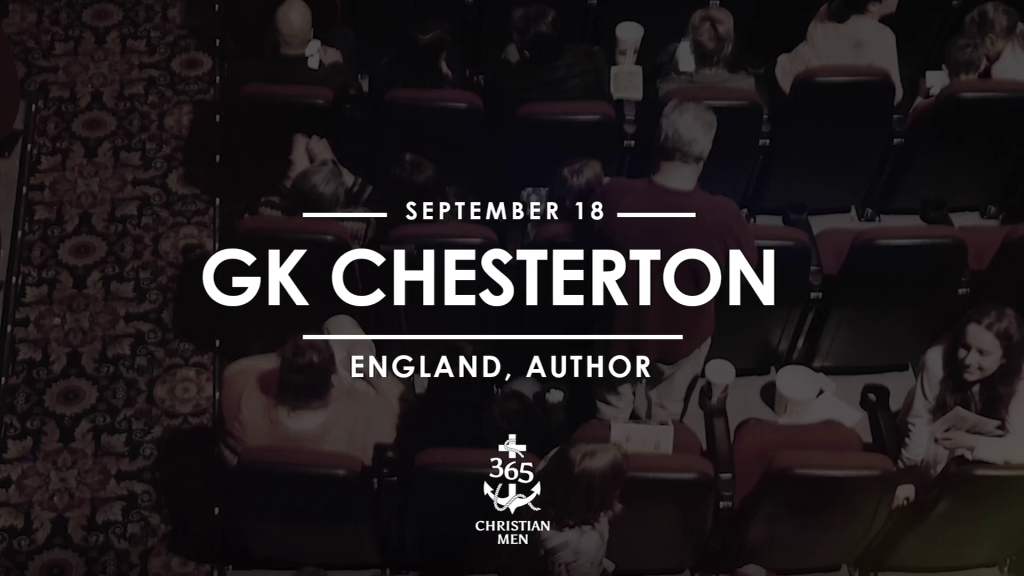September 18. GK Chesterton. Chesterton was an exuberant man, a keen debater, and a prolific writer—ninety books, ten novels, and many articles. Best known for his Father Brown mystery series, Chesterton was also a philosopher, lay theologian, and literary and art critic. He has a camp of followers and a camp of haters. Either way, he makes a reader think deeply.
Chesterton knew how to have fun, and he knew how to do serious work. On this date in 1909, Chesterton influenced Ghandi about India’s independence.
When weak thinking undermines truth, thinking people must speak up.
Chesterton lived in an era of intellectualism when it was popular to debate in public, to trade witty barbs with your opponents, and to deny the existence of God.
Chesterton was an intellectual, too, and a lover of the one true God. It was his duty and his calling to speak up against the lies being passed off as “the new truth.”
Chesterton was a 300-pound, six-foot-four man, who wore a cape and tiny glasses “pinched to the end of his nose.” This was the day he would debate his greatest opponent—and respected friend—George Bernard Shaw. They would argue about what to believe and how to live. As he had often done, Chesterton would wield his favorite weapon: words.
In an auditorium packed with a murmuring crowd, Chesterton lumbered toward the stage. Judging by the number of attendees, the gate had done well. It wouldn’t hurt his finances—if he had remembered to sign for his share of ticket sales. He couldn’t remember if he had.
Chesterton crushed his cigar. Straightened his crumpled hat. Finger-combed his magnificent mustache. This was going to be fun. He stepped onto the stage.
Shaw, with his snow-white hair and pressed black suit was Chesterton’s opposite. He was a vegetarian teetotaler, and he liked his cup of tea. Chesterton loved red meat, red wine, and a good cigar. But the important differences went deeper.
For a long, long time in the Western world, most people had believed in a God, who was a person and who had created the universe and everything in it. It was a given.
And this kind of thinking was called orthodoxy, which means “correct teaching.” But with the new wave of intellectualism, growing numbers of people called themselves atheists—who said, “there is no God” or agnostics—who said, “we can’t know whether there’s a god” or some ambiguous mix. Shaw called himself an agnostic.
Chesterton argued that an all-powerful, all-wise Creator did indeed exist. And the all-good Creator had sent His Son to save the world. Chesterton said Christianity had not “been tried and found wanting;” it had been “found difficult and left untried.”
Shaw said it was impossible for people to know whether a personal creator existed, and he actively promoted a Socialist agenda. The newspapers made a small fortune publishing the Chesterton-Shaw battles. And—not having TV or internet—people attended debates for the fun of watching these men try to outwit one another.
With extra drama to entertain the audience, Chesterton cast his gaze at Shaw. “To look at you,” he said to Shaw, “anyone would think a famine had struck England.”
Without a pause, Shaw responded, “To look at you, anyone would think you had caused it.”
The audience roared.
And so, the debate began.
Both Chesterton and Shaw had been Socialists as very young men. But Chesterton grew up, denounced Socialism, and became a Christian.
He chuckled. Despite their differences, he respected Shaw—and enjoyed matching his wit. They danced circles with words. The audience was always entertained. Chesterton and Shaw might banter, but they “would have died rather than really hurt” each other.
The advertised debate topic varied. But the specific topic didn’t matter. Shaw would fight for “progress.” And he said progress could only happen if men threw aside all belief.
Chesterton stood for reason and faith. He poked holes in Shaw’s theories. He believed his generation must “rediscover the reasons for believing” in God or humankind was “lost.” Chesterton’s admirers said he stepped into their confusion, turned “the tables on the heretics,” and exploded “their paper castles with a splutter of fireworks.” That was his plan. To fight for humanity by confronting its core problem—failing to believe in the one true God. He hoped his generation would “pay attention and gain understanding.”
“Listen, my sons, to a father’s instruction; pay attention and gain understanding. I give you sound learning, so do not forsake my teaching. For I too was a son to my father, still tender, and cherished by my mother. Then he taught me, and he said to me, ‘Take hold of my words with all your heart; keep my commands, and you will live’” (Proverbs 4:1–4 NIV).
For that purpose—and because there was little else as delightful as intellectual debate—he had taken this stage.
How do you confront weak thinking? When weak thinking undermines truth, thinking people must confront it.
Chesterton, GK. The Everlasting Man. 1925, Reprinted by Project Gutenberg, 2001. Accessed May 7, 2020. http://gutenberg.net.au/ebooks01/0100311. txt.
Chesterton, Gilbert Keith. The G.K. Chesterton Collection. The Catholic Way Publishing, 2014.
Story read by: Peter R Warren, https://www.peterwarrenministries.com/
Introduction read by: Daniel Carpenter
Audio production: Joel Carpenter
Story written by: Paula Moldenhauer, http://paulamoldenhauer.com/
Editor: Teresa Crumpton, https://authorspark.org/
Project manager: Blake Mattocks
© 2020, 365 Christian Men. LLC. All rights reserved.





